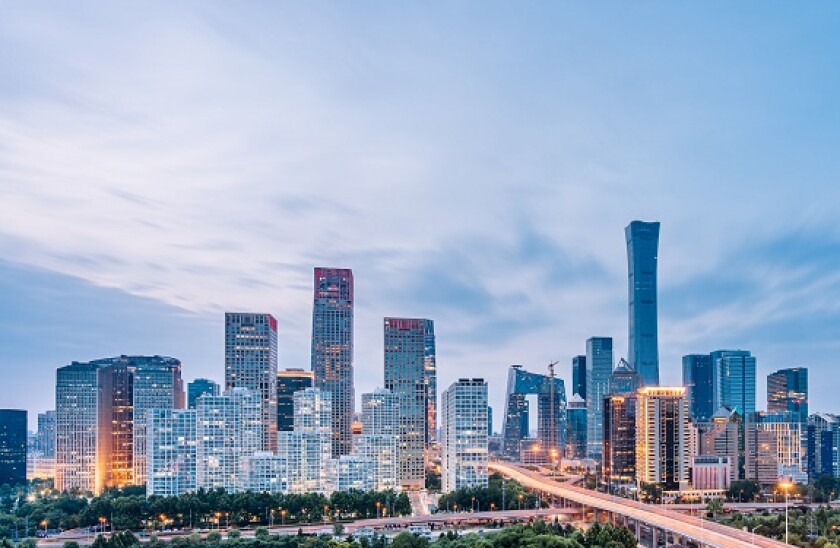Last Thursday, news broke that China is considering enacting a national security law in Hong Kong. The announcement, which triggered protests in the special administrative region, led to a sharp fall in Hong Kong’s Hang Seng index and caused some bankers to consider whether the city still offered them a viable future.
China’s proposed national security law was deemed by some to be an appropriate response to the protests that have rocked Hong Kong for nearly a year. The demonstrations, which began as an objection to a proposed extradition law and morphed into a broader battle against Beijing’s grip on Hong Kong, at times escalated to violence and the destruction of property.
But those objecting to the security law see it as the last straw for the long held “one country, two systems” standard that Hong Kong has operated under. If that political structure is abolished, the civil liberties of Hong Kong citizens will be put at risk, opponents to the bill say.
Investors spoke with their wallets. The Hang Seng closed 5.6% down last Friday, marking its worst performing day in five years. Demonstrators took to the streets again over the weekend, and stories of violence on both sides shook the city, leaving no doubt for investors that Hong Kong will not be settling down any time soon.
Investors are right to see Hong Kong as a hot bed of volatility for the time being but they should also consider the wider implications, particular the likely rise in tensions between China and the US.
He said, Xi said
Under US president Donald Trump’s administration, China has become a scapegoat for everything from Covid-19 to the loss of manufacturing jobs in the US. The anti-China sentiment in Washington has seeped from the most conservative wing of the Republican party to Democrats. US politicians now condemn China on multiple fronts, including raising questions about Chinese IPOs in the US.
It is clear that the proposed national security law will only increase tensions. US secretary of state Mike Pompeo called the proposed law a “death knell” for Hong Kong. The US Congress responded to China within hours, proposing its own bi-partisan bill to sanction China for violating Hong Kong’s autonomy.
China and the US have long been engaged in a tit-for-tat squabble. The coronavirus raised the stakes of that confrontation. The Chinese government’s proposal to push through the security law will raise them even further. As if more cause for worry was needed, a US election in November means the rhetoric is only likely to get more heated in the coming months.
This is all bad news for the capital markets. Of course, Chinese companies will be able to rely on their domestic capital market for fundraising. The country has a large, liquid market that has and will continue to accommodate the needs of its businesses.
But some Chinese companies need dollars and euros for their overseas businesses and refinancing, and they will be pressured into looking internationally for funding support. Investors will have to think twice about investing in these situations, whether in the bond market or the stock market. The sources of potential volatility are now stacking up too high for comfort.
Primary market issuance has been dented because of the Covid-19 pandemic, particularly in the high yield market. Many issuers have survived without feeling the crunch of impending maturities so far, but bankers say that the possibility of defaults and refinancing fears could increase if the market weakness drags on much longer.
The cracks in the system are already apparent. There have been several notable defaults in recent months. Most recently, Chinese oil and gas company MIE Holdings Corp missed an interest payment on a dollar bond, triggering a cross default with the company’s loans. The Hong Kong-listed business missed its first semi-annual interest payment on April 12, and had a 30-day grace period to meet its obligations.
In equities, investors were recently burned by Luckin Coffee. The company, China’s response to Starbucks, revealed in April that some of its sales transactions had been fabricated. The scandal led to the Nasdaq board’s decision this month to delist Luckin’s shares, and it has raised concerns about other Chinese companies that are listed in the US.
It doesn’t help that the US Senate passed a bill last week that would force foreign companies to delist from US exchanges if they do not comply with US regulatory audits. The bill doesn’t explicitly target Chinese companies, but it’s not a stretch to assume the proposed law would mark Chinese businesses as its most likely victims.
Much remains to be seen about the proposed laws on either side. Ambiguity will colour the coming months. But the uncertainty will make discerning investors think twice and raise concerns about the future of Chinese businesses in the international capital markets.
The coronavirus may no longer be a major drag on business in Hong Kong, but things show no signs of looking up. It’s going to be a long year.

